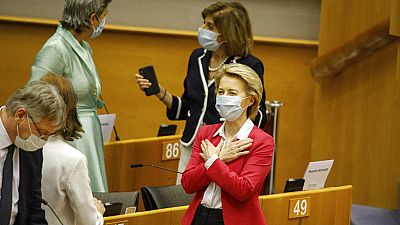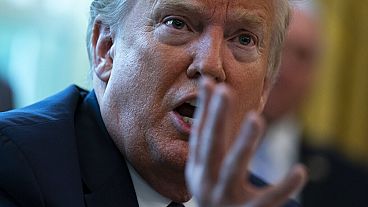America is far from the perfectly functioning currency area so beloved by its European devotees. Rather, the US model of limited government at state level has exposed the fragile nature of the American dream.
For its European groupies, the US economy seems like a model of Anglo-Saxon excellence. It’s also the European Commission’s ultimate currency union fantasy, complete with fiscal stabilisers, high labour mobility and enough central bank firepower to flatten a thousand COVID-19s.
But such American adoration is misplaced. Because what the events of the past three months have shown is that it’s the United States’ economy, not the eurozone, that’s in danger of collapse.
America is far from the perfectly functioning currency area so beloved by its European devotees. Rather, the US model of limited government at state level has exposed the fragile nature of the American dream; a fragility exacerbated by a federal system incapable of working past partisan political concerns.
The result has been a free-for-all among individual states clamouring for federal aid. Governor Cuomo’s depiction of eBay-style bidding wars between states for essential hospital supplies is mirrored across whole sectors of the American economy. It’s even forced many states to combine efforts in the hope of increasing their purchasing firepower (from their own government suppliers).
Is this really the American ideal of life, liberty and the pursuit of happiness?
Mitch McConnell’s stated aversion to “blue state bailouts” highlights just how politically tinged the US federal system has become. “Well run states should not bail out poorly run states” has become the new mantra of President Trump. Solidarity is fast becoming another American rarity, just like balanced budgets and social mobility.
The EU should count its lucky stars. A eurozone fiscal union in this virus crisis would have killed the single currency, not saved it.
The ability of the US to withstand a drawn out public health pandemic (with associated economic and social crises) is also limited by the nature of its government at state level. Unable to run deficits due to a strict no-bailout rule enforced by Washington DC, many states now rely heavily on emergency federal aid to keep the lights on and food on the table.
And that federal aid is increasingly dependent on inconsistent political priorities in the White House.
The gap between economic growth and a longer term recession is narrowing daily in the US. Unemployment benefits offered by states are tied directly to employment. Workers forfeit their benefits when their bosses call them back to work, even if they’re too scared or too unwell to return.
Mitch McConnell’s proposal to link badly-needed federal aid to state governments with providing legal immunity to companies that cause workers (or consumers) to become infected sums up just how close the US is to real societal disintegration.
This isn’t a functioning currency union; it’s more like a modern day Hunger Games for the pandemic generation.
The prolonged nature of this crisis is also targeting the most tender spots of the US economy. Reduced consumer demand (even as reopening continues) will persist for years, not months. Consumer spending accounts for over 70% of the American economy. It’s a recipe for long-term economic contraction.
America also spends more on healthcare than any other developed country (17% of GDP, compared to 11% in France) and boasts many of the world’s leading health facilities. But for ordinary Americans, it represents a fragmented, expensive, privatised system that is largely failing the coronavirus test. Billion-dollar medical groups are competing with small rural hospitals desperate for basic supplies.
Many will scoff and argue that America is simply is too big to fail. Perhaps, but picture America following a second - or possibly a third - wave of COVID-19. An America of staggering unemployment and a limited social security safety net. An America of increasing poverty and of a federal government debt-to-GDP ratio much closer to Greece than to Germany.
This will be an America at the mercy of global economics, of currency speculators and, of course, the Chinese; the same Chinese who own most of America’s federal debt. It’s the stuff of nine million dreams in Beijing.
Drawing parallels with the Great Depression of the 1930s has become a new favourite pastime of many economists. What’s often overlooked is the fundamental societal changes which arose from this period of economic contraction.
The Detroit riots of unemployed Ford workers in 1932 so startled policymakers that it resulted in the swift development of a property-owning working class (facilitated by cheap federal mortgages). It is the societal model which still dominates in the US and in much of the world today, the point being that economic upheaval of the scale we are now experiencing will have far reaching, and often unintended, economic and societal consequences.
The funny thing about American economists is that many of them viewed the euro as a terrible idea which would never last even if it somehow managed to get off the ground. Some felt that it would lead to riots on European streets as the inequalities of the single currency system became clear for all to see.
But Europe and its stumbling economies aren’t the real problem. The Americans need to look closer to home.
- Dr Eoin Drea is a Senior Research Officer at the Wilfried Martens Centre for European Studies and a Research Fellow in the School of Business at Trinity College Dublin.
____________
Are you a recognised expert in your field? At Euronews, we believe all views matter. Contact us at view@euronews.com to send pitches or submissions and be part of the conversation.



